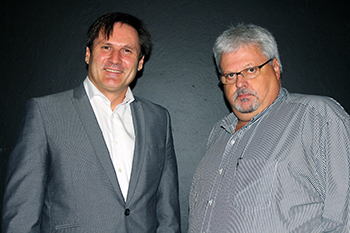Latest News Archive
Please select Category, Year, and then Month to display items
05 April 2021
|
Story Dr Nitha Ramnath
|
Photo Supplied
 Jamba Isaac Ulengo.
Jamba Isaac Ulengo.
François van Schalkwyk and Keenan Carelse, UFS alumni leading the university’s United Kingdom Alumni Chapter, have put their voices together to produce and direct the podcast series. Intended to reconnect alumni with the university
and their university experience, the podcasts will be featured on the first Monday of every month, ending in November 2021. Our featured alumni share and reflect on their experiences at the UFS, how it has shaped their lives, and relate
why their ongoing association with the UFS is still relevant and important. The podcasts are authentic conversations – they provide an opportunity for the university to understand and learn about the experiences of its alumni and to celebrate
the diversity and touchpoints that unite them.
Our podcast guest
Born in the North West town of Vryburg, Ulengo first played provincial rugby at the U16 Grant Khomo Week in 2005. While attending Jim Fouché High School in Bloemfontein, Ulengo was chosen to represent the Free State at various youth levels. As
an up-and-coming player, Ulengo made his break via the FNB Varsity Cup Competition where he starred for the Shimlas, scoring 11 tries in 18 appearances over the three seasons between 2010 and 2012. A short stint with the Free State Vodacom Cup side
saw him make his debut for the Blitzboks (Glasgow 2012), followed by a tournament at the London Sevens in 2014. Ulengo has been a prominent member of the South African Sevens since making his debut for the team in the Scotland leg of the 2011-2012
IRB Sevens World Series. He played in the two final tournaments of that season and then signed a two-year contract with the South African Rugby Union to represent the team in the 2012-2013 and 2013-2014 series. While he only competed at four events
in his first full season, he was involved in seven of the tournaments in his second season.
Ulengo made his return to the sport by signing a contract to play Currie Cup rugby for the Pretoria-based Blue Bulls in 2014 and for their Super Rugby franchise, the Bulls, from the 2015 Super Rugby season.
Internationally-renowned futurist proposes innovation in corporate management
2016-05-10

Pieter Geldenhuys, guest speaker at the seminar, who mapped the future of corporate management (left) with Dr Vic Coetzee, Senior Director: Information and Communication Technology Services at the UFS (right).
Photo: Hatsu Mphatsoe
|
Humans need to adapt their thinking to the world’s changes. This is Pieter Geldenhuys’s conviction.
The Information and Communication Technology Services (ICT) at the University of the Free State hosted a seminar on 22 April 2016 at the Bloemfontein Campus. Geldenhuys, the Director of the Institute for Technology Strategy and Innovation at North-West University and internationally-renowned futurist, presented his views on technology, innovation, and corporate management on this occasion.
Geldenhuys, a well- known speaker, academic, and futurist, is in the business of identifying opportunities in the changing technological and social landscape with the aim of assisting companies to prepare for the future, while being an active agent in defining it. Lately, he has been exploring the concept of a new kind of management science, which he believes is a prerequisite for institutions such as ours.
This management science incorporates physics in improving corporate management. “We have an unbelievable grasp of the world of physics,” he said, suggesting that we use our knowledge of nature to capitalise on individual and collective strengths within institutions.
He said that minor changes can change one’s future or that of an organisation completely. He even went as far as to state that the culture of an organisation is the one that determines how well you do. Relating to the adaption of organisations in a constantly changing and dynamic environment, Geldenhuys advised that, “when faced with disruption, don’t retaliate; accept.”
By making use of different tools, such as technology aw well as social and business trends, Geldenhuys is adamant that corporations and institutions will adapt easily to the world’s complex systems.